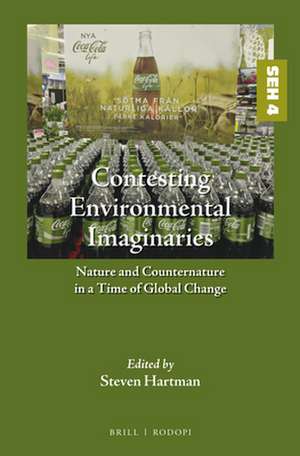Contesting Environmental Imaginaries: Nature and Counternature in a Time of Global Change
Editat de Steven Hartmanen Limba Engleză Hardback – 29 mar 2017
Preț: 607.68 lei
Preț vechi: 741.07 lei
-18% Nou
116.28€ • 126.70$ • 97.98£
Carte indisponibilă temporar
Specificații
ISBN-10: 9004335072
Dimensiuni: 155 x 235 mm
Greutate: 0.59 kg
Editura: Brill
Colecția Brill
Cuprins
Steven Hartman: Naturalizing Culture and Countering Nature in Discourses of the Environment
Part 1: Re-contextualizing Nature
Klaus Benesch: Day and Night: Topography and Renewal in Thoreau’s Walden and Douglass’s Narrative
Tatiani G. Rapatzikou: James Schuyler’s Flower Poems and the Urban Pastoral Aesthetic
Øyunn Hestetun: Palimpsest of Subjugation: Inscriptions of Domination on the Land and the Human Body in Jane Smiley’s A Thousand Acres
Mark Luccarelli: Reframing American Naturism? Space, History and the Rise of Environmental Discourse
Part 2: Challenging Nature and Envisioning Counternatures
Lawrence Buell: Uses and Abuses of Environmental Memory
Ursula K. Heise: Environment, Technology and Modernity in Contemporary Japanese Animation
Torben Huus Larsen: A Harmony of Murder: Transatlantic Visions of Wilderness in Werner Herzog’s Grizzly Man
Marcus Nordlund: Literary Appreciation: A Biocultural View
Part 3: Applying Counternatures
Henrik Otterberg: Dark Darwin: (D)evolutionary Theory and the Logic of Vampirism in Bram Stoker’s Dracula
Torsten Pettersson: Why Should We Respect Nature? An Appropriation of Nietzsche
Karen Lykke Syse: Histories and Ideologies of Nature in Argyll
Adriana Méndez Rodenas: “Picturing Eden”: Contesting Fredrika Bremer’s Tropics
Håkan Sandgren: Life Under Water: Narratives of Deep Sea Counternatures
David E. Nye: Superfund Sites as Anti-Landscapes
Index
Notă biografică
Descriere
Contesting Environmental Imaginariese foregrounds a question central to humanistic environmental studies: How is nature to be perceived and understood in a time of global environmental crisis? A challenge was issued to imagine counter natures, past or present, casting nature as a normative concept into productive relief. One ambition was to highlight shifting perspectives on nature and the environment that may help account for the rise of the environmental humanities; another was to invite challenges to orthodoxies, including those that animate this burgeoning field. Contributions emerged from the study areas of Environmental History, Ecocriticism, Cultural Studies, American Studies, Caribbean Studies, Scandinavian Studies, Media Studies, and the History of Ideas. This volume draws together the fruits of this thought experiment.
